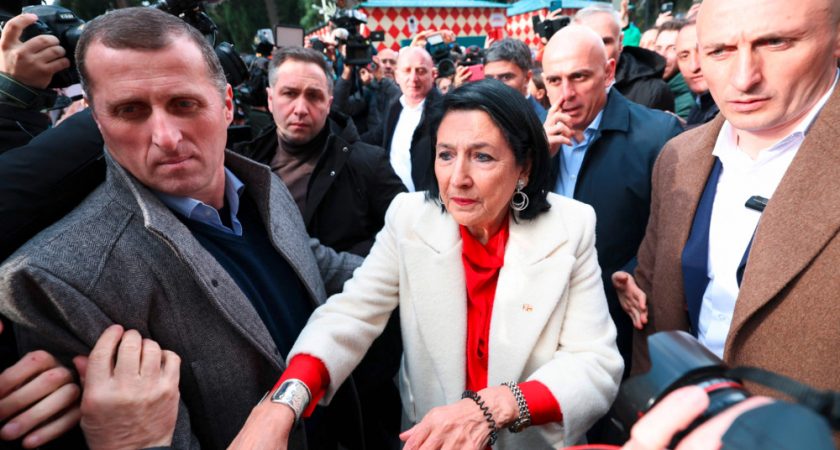The new president of Georgia was sworn in amidst a backdrop of political turmoil and street protests on December 29th. This event marked a new chapter in the ongoing political crisis that has gripped the country for weeks, with large-scale pro-European demonstrations taking center stage.
The Story So Far:
In a controversial move, Mikheil Kavelashvili, known for his ultraconservative and anti-Western views, took the oath of office in Parliament, succeeding Salome Zourabichvili. His election by an electoral college controlled by the ruling party, Georgian Dream, sparked outrage among opposition forces and pro-democracy activists.
In his inaugural speech, Kavelashvili emphasized the importance of peace for the Georgian people, positioning himself as a bulwark against Western influence that could potentially drag Tbilisi into the conflict between Russia and Ukraine. Meanwhile, Zourabichvili, after announcing her departure from the presidential palace, asserted her legitimacy as the rightful president of the country, setting the stage for a political showdown.
Following the new president’s investiture, thousands of protesters marched from the presidency to Parliament, the focal point of the ongoing demonstrations in the Georgian capital. While some waved red cards in reference to Kavelashvili’s past as a footballer, the majority dispersed peacefully, with a few vowing to continue their fight for change.
The Review:
The political landscape in Georgia has been tumultuous since the disputed parliamentary elections in October, which saw Georgian Dream secure victory amid allegations of electoral fraud by the pro-Western opposition. The situation escalated further when Prime Minister Irakli Kobakhidze announced a delay in the country’s EU integration efforts, triggering daily pro-European protests that have persisted.
With Zourabichvili’s departure, protesters lost a key ally within the government. Despite her limited powers, she had thrown her weight behind the demonstrators and leveraged her influence, both domestically and internationally, to push for new elections—a demand that the ruling government has vehemently rejected. Accusations of foreign-backed subversion have been hurled by both sides, further polarizing the nation.
While the protests have been ongoing, violent clashes have been sporadic. Over 400 individuals have been arrested, including opposition leaders, and dozens of police officers have been injured in the confrontations. Reports of police brutality and alleged torture of detainees have raised concerns about human rights violations in the country.
Recently, the United States and the United Kingdom imposed sanctions on several high-ranking Georgian officials, including billionaire Bidzina Ivanishvili, who wields considerable influence over Georgian Dream. The ruling party has faced criticism for veering away from its once-liberal and pro-European stance towards authoritarianism, adopting controversial laws reminiscent of those in Russia that target civil society, independent media, and LGBTQ+ rights.
Conclusion:
The political upheaval in Georgia underscores the deep divisions within the country and the challenges it faces in navigating its future trajectory. With ongoing protests, international scrutiny, and internal strife, the road ahead remains uncertain. The standoff between the ruling government and the opposition shows no signs of abating, raising concerns about the country’s democratic fabric and stability.
Frequently Asked Questions:
- What sparked the political crisis in Georgia?
The political crisis in Georgia was triggered by the disputed parliamentary elections in October, which led to allegations of electoral fraud and widespread protests. - Who is Mikheil Kavelashvili, the new Georgian president?
Mikheil Kavelashvili is known for his ultraconservative and anti-Western views, and his election by an electoral college controlled by the ruling party sparked controversy and street protests. - Why did Salome Zourabichvili leave the presidential palace?
Salome Zourabichvili declared herself the legitimate president of Georgia and left the presidential palace to stand with her supporters, challenging the legitimacy of the new president. - What are the key issues that have fueled the protests in Georgia?
The protests in Georgia have been driven by concerns over electoral integrity, EU integration delays, and accusations of authoritarianism and anti-Western shifts within the ruling government. - What role has the international community played in the Georgian crisis?
The United States and the United Kingdom have imposed sanctions on high-ranking Georgian officials, raising international pressure on the government and highlighting concerns about democratic backsliding. - How have the protests in Georgia unfolded since the elections?
The protests in Georgia have been ongoing since the elections, with sporadic clashes between demonstrators and police, arrests of opposition leaders, and allegations of police brutality. - What are the implications of the political crisis for Georgia’s future?
The political crisis in Georgia has raised questions about the country’s democratic resilience, stability, and path forward, with uncertainty looming over its political landscape. - How has the ruling party in Georgia responded to the protests?
The ruling party in Georgia has accused the opposition of attempting to foment a revolution with foreign backing, rejecting calls for new elections and cracking down on dissent. - What are the key concerns raised by human rights groups in Georgia?
Human rights groups have raised concerns about police brutality, alleged torture of detainees, and restrictions on civil liberties, media freedom, and LGBTQ+ rights in Georgia. - What are the next steps for Georgia in resolving the political crisis?
The path forward for Georgia involves dialogue between the government and opposition, addressing electoral grievances, upholding human rights, and restoring trust in democratic institutions.Tags: Georgia, Political Crisis, Protests, Democracy, Human Rights, International Relations, Authoritarianism

